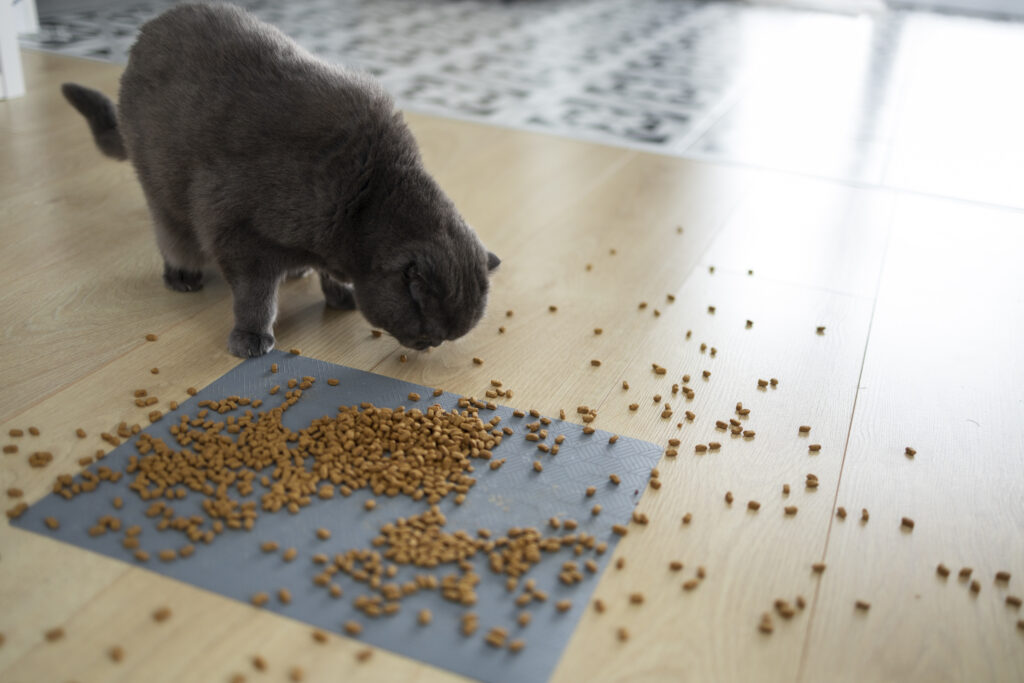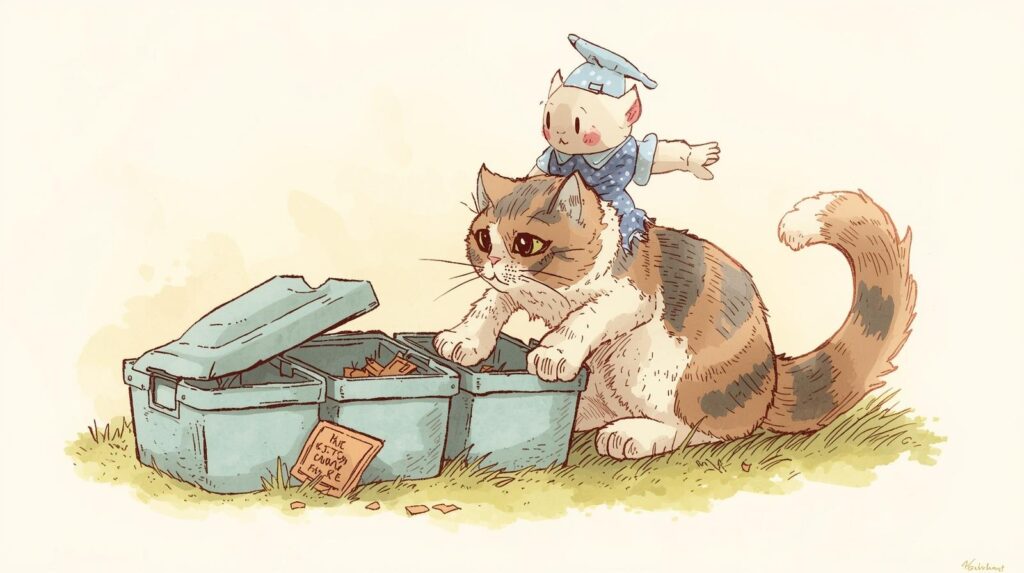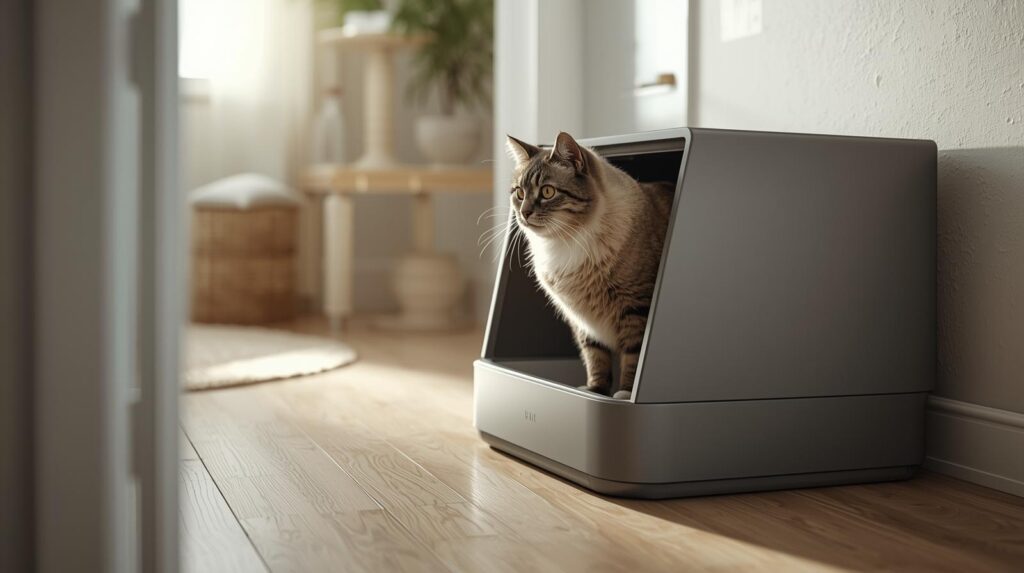Have you ever wondered why your cat spends so much time digging in their litter box? Whether it’s that distinctive scratching sound or the sight of litter scattered everywhere, it’s a behavior that’s occasionally frustrating for you as a cat owner.

Knowing why cats dig in their litter boxes can shed light on their instincts and behaviors, offering insights into how to better care for our feline friends. Let’s dig into the reasons behind this seemingly simple yet significant habit.
Table of Contents
why do cats dig into the litter?
Cats have an instinct to dig into their litter boxes, which stems from their wild ancestry. In the wild, cats dig to cover their waste, instinctively concealing their scent from potential predators. This behavior is deeply ingrained and continues in domestic cats.
Digging serves multiple purposes for them—it helps them feel secure by creating a private space and allows them to carefully choose the perfect spot to relieve themselves.
Additionally, cats use digging as a means to maintain cleanliness, ensuring that their bathroom area remains tidy and odor-free. Providing a suitable litter box with enough depth and comfortable substrate mimics their natural environment, satisfying their instinctual need to dig and cover their waste.
Normal Behavior vs. Problematic Digging Behavior
Cats’ behaviors often reflect their instincts for survival, comfort-seeking, and communication through subtle cues.
Normal cat behavior involves digging to cover waste, which is instinctual for cats to maintain cleanliness and mask their scent from potential predators. However, excessive digging, persistent scratching, or attempts to dig outside the litter box may indicate issues such as stress, medical problems, or dissatisfaction with the litter box setup.
As a cat owner distinguishing between these behaviors is crucial for addressing any underlying issues and ensuring your cat’s well-being.
Possible Reasons for Excessive Digging
Your cat’s excessive digging in the litter box can be a puzzling behavior for you. Here are some common reasons why your cat might be digging more than usual:

- Litter Box Preferences: Cats are particular about their litter box setup. They may dig excessively if they dislike the type of litter, its depth, or the cleanliness of the box.
- Medical Issues: Certain medical conditions such as urinary tract infections or gastrointestinal problems can cause discomfort, leading cats to dig excessively as a sign of distress.
- Stress or Anxiety: Changes in their environment, household routines, or even new pets can stress cats, prompting them to exhibit abnormal behaviors like excessive digging.
- Instinctual Behavior: Some cats may dig excessively due to strong instinctual behaviors related to hunting, nesting, or territorial marking.
- Litter Box Size: If the litter box is too small or cramped for your cat, they may dig excessively to find a comfortable position or to cover waste adequately.
- Maggots in the litter: This may be the reason that your cat is digging in her litter that maggots are living there.
- Bed bugs: Sometimes bed bugs also make litter box their home
By understanding these potential reasons can help you identify the cause behind this behavior and take appropriate steps to address your cat’s behavior effectively. If you want your home Purrfect clean and tidy so make your cat happy about its litter box and prioritize its needs.
Certainly! Here’s a human-like and straightforward approach to solutions:
Solutions to Stop Your Cat from Digging in the Litter
Dealing with a cat that won’t stop digging in their litter box can be frustrating, but there are practical steps you can take to encourage better behavior:

- Choose the Right Litter: Experiment with different types of litter to find one that your cat prefers. Some cats may dislike certain textures or scents. You can also make zero waste litter through shredded newspaper or choose from one of them here.
- Maintain Cleanliness: Scoop the litter box at least once a day and change the litter completely every 1-2 weeks. Cats prefer a clean environment and may dig excessively if the box is dirty.
- Provide Enough Litter Depth: Aim for a depth of about 2-3 inches of litter. This allows your cat to comfortably cover their waste without feeling the need to dig excessively.
- Consider the Litter Box Size: Ensure the litter box is large enough for your cat to move around comfortably. A cramped space may encourage excessive digging.
- Behavioral Enrichment: Engage your cat in play and provide scratching posts or pads. Physical and mental stimulation can reduce stress-related digging behaviors.
- Address Stress and Anxiety: If your cat’s digging is due to stress or anxiety, try to identify and eliminate the source of stress. Providing a quiet, predictable environment and plenty of enrichment activities can help.
- Consult with Your Vet: If your cat continues to dig excessively despite trying these solutions, consult your veterinarian. They can rule out any underlying medical issues contributing to the behavior.
You must understand your cat’s preferences and address potential stressors, you can help discourage excessive digging and create a more comfortable litter box experience for your cat. By doing these steps you can stop your cat from excessively digging and maintain her manners and behavior normal.
When to Seek Vet Professional?
Here are situations where consulting a veterinarian or a professional behaviorist is recommended:
- Persistent Excessive Digging: If your cat continues to excessively dig in the litter box despite adjustments in litter type, depth, and cleanliness.
- Accompanied by Other Changes in Behavior: If digging is accompanied by other unusual behaviors such as avoiding the litter box altogether, vocalization while using the box, or signs of discomfort.
- Medical Concerns: If your cat shows signs of discomfort or pain while using the litter box, such as straining, vocalizing, or blood in the urine or feces.
- Sudden Changes in Litter Box Habits: If your cat suddenly starts digging excessively or avoids the litter box altogether, it could indicate a medical issue such as urinary tract infection, constipation, or arthritis.
- Failure of Behavioral Modifications: If you’ve tried various environmental changes and behavioral modifications without improvement in your cat’s litter box behavior.
- New Cat or Environmental Stressors: Introducing a new cat to the household or other significant changes in the environment can sometimes trigger litter box issues that may require professional guidance to resolve.
Conclusion: Addressing Excessive Digging in Cats
Understanding and addressing excessive digging in your cat’s litter box is essential for their health and well-being. By providing a suitable litter environment—adequate depth, appropriate litter type, and cleanliness—you can cater to their natural instincts while ensuring comfort.
However, persistent issues or accompanying changes in behavior warrant professional evaluation by a veterinarian or behaviorist.
Through a combination of environmental adjustments, behavioral enrichment, and expert guidance, you can promote healthy litter box habits and ensure a happier, more contented cat.
Common Questions About Cat Litter Box Digging
Q1: Why does my cat dig so much in the litter box?
Cats have a natural instinct to dig and cover their waste to conceal their scent from potential predators. This behavior also helps them maintain cleanliness and choose a suitable spot to relieve themselves comfortably.
Q2: How deep should the litter be in the litter box?
Ideally, the litter should be about 2-3 inches deep. This depth allows your cat to comfortably dig and cover their waste while providing enough substrate to absorb urine and control odor.
Q3: What type of litter is best for cats who dig excessively?
Cats have preferences for litter texture. Experiment with different types such as clumping, non-clumping, silica, or natural materials to find one your cat prefers. Some cats may prefer finer textures while others prefer coarser ones.
Q4: My cat has started digging excessively. Could this indicate a health problem?
Yes, excessive digging could indicate underlying health issues such as urinary tract problems, constipation, or arthritis. It’s important to monitor your cat for any signs of discomfort or changes in litter box habits and consult with a veterinarian if concerns arise.
Q5: How can I stop my cat from digging outside the litter box?
Ensure the litter box is placed in a quiet, accessible location and provide enough litter boxes (one per cat plus one extra) in different areas of the house. Address any stressors or changes in the environment that may be causing your cat to dig outside the box. Consulting with a veterinarian or behaviorist can also help identify and address the underlying cause.


